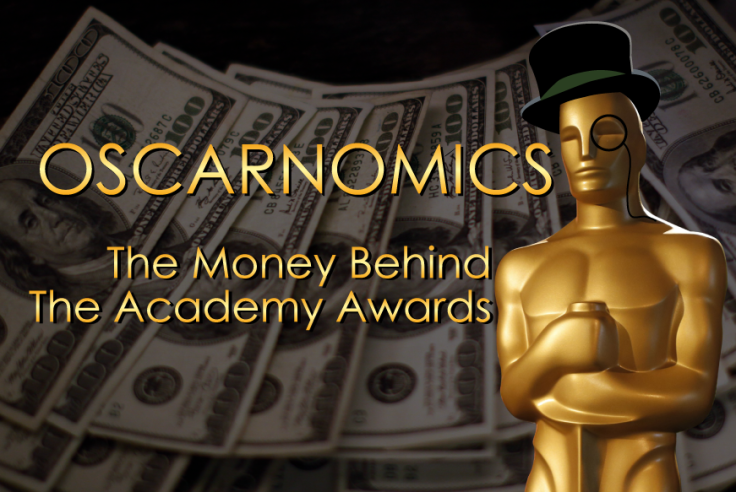Who Makes Those Oscar Envelopes? See How The Process Unfolds

This is the first in a five-part series on the economics of the Oscars.
The entire process takes weeks. And naturally, it’s shrouded in secrecy.
When the Oscar presenter opens that envelope to reveal the winner’s name, it’s the culmination of a journey that starts at a paper mill in Bavaria, Germany, and extends to a workshop on L.A.’s Venice Boulevard, where white-gloved workers carefully hand-press every crease and write every word.
After three or four final checks, 90 pounds of final product gets packed into unmarked cardboard boxes. It’s all driven to a prearranged meeting point and handed off to two men who can keep a secret, and they take the packages to an undisclosed location. The guy behind the envelope operation doesn’t even know where. But his work will get him a seat at the big event.
"Just call me the Tom Ford of paper and stationery," says Marc Friedland, 54, founder and creative director of Los Angeles-based Marc Friedland Couture Communications, in an interview with IBTimes.
This will be Friedland’s fourth time designing and producing the envelopes used for the Academy Awards ceremony, with the annual project reported to bring his company more than $10,000. Before he proposed the idea of special envelopes befitting the glamorous occasion, they were plain and functional, a few packs from the local Staples.
“The Oscar envelope has always been a dream of mine; it was always on my radar,” says Friedland. “There are two basic phrases associated with the famous event: ’The Oscar goes to' has the statuette, but ‘The envelope, please’ never had its own iconic look.”
For the first decade of Academy Awards ceremonies, there were no envelopes at all -- winners’ names were released to newspapers under embargo for 11 p.m. on Oscar night. But in 1940 the Los Angeles Times leaked the results early, so envelopes have been used every year since to maintain secrecy.
Friedland’s business now designs not only the envelopes and winner cards but also the invitations for Oscar-related events such as the Governor’s Ball. He’s quite well-connected with celebrity, counting Jennifer Anniston, Sean "P.Diddy" Combs and Quincy Jones among his individual clients. He produces custom work for everything from Brad Pitt’s Christmas cards to Oprah Winfrey’s 50th birthday party, and his impressive corporate-client roster includes American Express Company (NYSE:AXP), JPMorgan Chase & Co. (NYSE:JPM), Converse Inc. and Warner Bros.
For clients of this caliber, the materials have to be the finest.
Custom-made paper stock for the Oscar envelopes is produced at a press in Bavaria, and different suppliers from around the world provide the ribbon, gold leaf, ink and other materials required, though Friedland prefers to keep those suppliers confidential.
Though the materials are imported, all Friedland's products are "made in Hollywood exclusively for Hollywood, which is kind of fun,” he says, adding how proud he is to practice a craft at a time when that’s less common among for American businesses.
Friedland’s 10-member Oscar team does everything by hand, clocking somewhere around 100 hours of laminating, folding, gluing, wrapping, embossing and printing and using at least 40 yards of red ribbon. Each envelope is stamped with the Oscar statuette pattern made with gold leaf and gets a satin gold foil frame, with a panel in the center around the category name. Written on the card inside is: "And the Oscar goes to..." with the winner's name hand-written in charcoal ink.
And what about the secret contents? People are constantly asking Friedland whether he knows.
"If I knew the winners, I wouldn't be here; I'd be in Vegas," he says. In fact, the set his company prepares comprises all the nominees. Even though there are only 24 categories, they make up 72 envelopes and 363 cards – one for every nominee.
After a few rounds of proofreading against a list provided by the Academy, they’re all handed off to agents from PricewaterhouseCoopers, the accounting company responsible for tabulating the votes.
This year, that responsibility falls to PwC accountants Brian Cullinan and Rick Rosas, who will stuff two sets of envelopes into two identical briefcases and destroy the leftovers. Later they’ll walk the red carpet and settle in backstage to hand each winning envelope to the presenters.
They’ll be the only two men in the world who know the winners before anyone else, and part of the handful of people who will ever hold the envelopes.
The winner is the holder who matters most to Friedland. "That one envelope, with all its low-tech elements,” he says, “captures emotion that will last a lifetime."
© Copyright IBTimes 2024. All rights reserved.






















